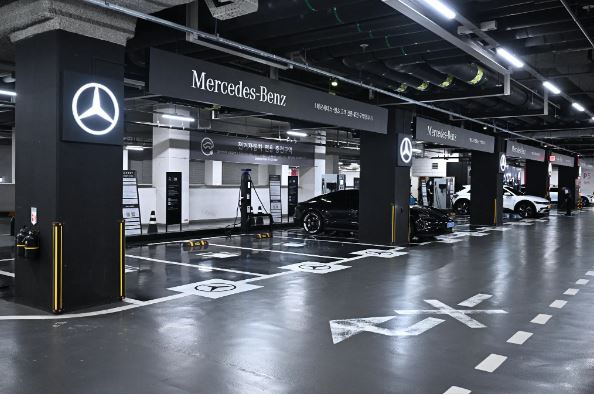Earlier this month, a Mercedes-Benz electric sedan caught fire in an underground parking lot of an apartment complex in Incheon, South Korea, triggering a massive blaze that damaged nearly 900 cars and led to 23 people suffering from smoke inhalation. The fire, which broke out around dawn on August 1, took firefighters over eight hours to extinguish as temperatures soared above 1,500 degrees Celsius, according to local officials.
Though electric vehicle (EV) fires are significantly less common than those involving gasoline-powered cars, the severity and scale of the Incheon incident have drawn widespread attention across South Korea, one of the world’s largest car producers. The fire has raised safety concerns that could potentially slow the government’s aggressive push toward electric vehicles.
In the aftermath of the fire, EV owners in South Korea have expressed growing fears about the safety of their vehicles. K Car, a popular secondhand car sales platform, reported that listings by EV owners looking to sell their cars had nearly tripled since the incident. Lee Min, a Seoul office worker who is in the market for her first car, voiced her concerns: “I know that EVs might be the more environmentally friendly choice, but I’m still afraid of it catching fire. I got even more scared after seeing the Incheon incident.”
The media and social media reactions to the fire have largely focused on the perceived risks associated with battery charging. In response, car manufacturers and government officials have attempted to reassure the public. The Seoul municipal government announced that by the end of the next month, it would implement measures to prevent EVs from being fully charged in parking lots beneath residential buildings, capping charges at 90 percent to reduce the risk of overcharging. However, some experts have questioned the effectiveness of this measure in significantly improving safety.
Several automakers, including Mercedes-Benz Korea, have offered free safety checks on EVs and disclosed their battery suppliers to alleviate public concern. Mercedes-Benz revealed that the battery in the sedan that caught fire was supplied by the Chinese company Farasis Energy, though the company has not responded to requests for comment.
The Incheon fire comes at a time when South Korea’s EV market had been experiencing rapid growth. Last year, EVs accounted for 9.3 percent of new cars sold in the country, according to official data. The South Korean government has been aggressively promoting the adoption of electric vehicles, offering subsidies for buyers and tax breaks for manufacturers as part of its strategy to reduce greenhouse gas emissions by 40 percent by 2030, compared to 2018 levels. The government aims to phase out the sale of gasoline-powered vehicles entirely by 2035.
Despite the government’s efforts, the Incheon fire has cast a shadow over the future of EVs in the country. Over the past six and a half years, there have been nearly 200 EV fires in South Korea, according to government figures. This number does not include a recent fire at a lithium battery factory near Seoul, which resulted in the deaths of 23 workers—one of the worst industrial disasters in recent years.
Lithium, the key component in most EV batteries, is known for its ability to store large amounts of energy in a compact form. However, it also burns intensely when ignited, and currently, there are no government-approved extinguishers specifically designed to combat lithium battery fires, according to South Korea’s national fire department.
Statistical data from the United States’ National Transportation and Safety Board shows that EVs catch fire less frequently than gasoline-powered vehicles—25 fires per 100,000 EVs compared to 1,530 fires for gasoline vehicles. However, when EV battery fires do occur, they tend to be more intense and damaging.
The Incheon fire has particularly resonated in South Korea, where many people live in apartment complexes with shared underground parking lots. Security footage from the incident shows smoke emanating from the Mercedes EQE 350 before it erupted into flames. The vehicle, which was parked in a lot with a capacity for about 2,000 cars, was not plugged in at the time, according to local fire authorities. Hundreds of residents were temporarily displaced while repair work was carried out.
In the days following the fire, Mercedes-Benz Korea’s president, Mathias Vaitl, announced that the company would pay 4.5 billion won (around $3.4 million) to affected residents. Mercedes-Benz expressed deep regret over the incident but did not comment on the specific cause of the fire. The German automaker also released a list of its battery suppliers, prompting other companies like Hyundai and Kia to follow suit. Over the weekend, the government announced plans to require all automakers to disclose their battery suppliers by early next year.
The South Korean government has discussed comprehensive measures to address public concerns and prevent similar incidents from occurring in the future. However, experts like Professor Lee Ho-Geun of Daeduk University argue that the government needs to upgrade charging infrastructure and fire-response systems to effectively reduce the risk of EV fires. He cautioned that a 90-percent cap on battery charges alone is unlikely to prevent all fires, comparing it to “asking a smoker to smoke two cigarettes instead of three.”

